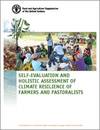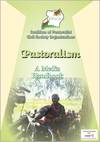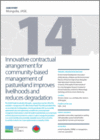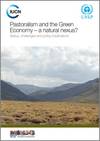This publication presents the scientific background of the Self‑evaluation and Holistic Assessment of climate Resilience of farmers and Pastoralists (SHARP) tool. SHARP assesses resilience through a participatory survey to both measure resilience and to engender discussions on how to increase farmers’ and pastoralists’ resilience. It was was developed over two years with the participation of over 150 academics, practitioners and civil society. SHARP was also field tested in Angola, Burkina Faso, Mali, Senegal and Uganda with farmers and pastoralists. It has been recognized that there is a need to both provide a rigorous assessment of the resilience of farmers and pastoralists, while also incorporating the views and needs of those people.
Year of publication: 2015Organization: Organización de las Naciones Unidas para la Alimentación y la Agricultura (FAO)
Topic: Cambio climático, Resiliencia
Language: English
Type of document: Científico
Geographical coverage: África Occidental, África Central, África Oriental, África Meridional
This report explores insights from five case studies that have made significant recent progress in addressing the challenge of insuring poor smallholder farmers and pastoralists in the developing world. Evidence from these case studies can inform the ongoing debate about the viability of scaling up index-based insurance for vulnerable smallholder farmers in the developing world. The rapid progress observed in recent years suggests that index insurance has the potential to benefit smallholder farmers at a meaningful scale, and suggests the need to reassess arguments that lack of demand and practical implementation challenges prevent index-based insurance from being a useful tool to reduce rural poverty.
Year of publication: 2015Organization: Programa de Investigación sobre Cambio Climático, Agricultura y Seguridad Alimentaria (CCAFS)
Topic: Economía, Innovación, Servicios sociales
Language: English
Type of document: Técnico
Geographical coverage: Global
This media handbook provides a quick reference guide that can be used by journalists and other media practitioners to help influence perceptions, policy and practice related to pastoralism among Ugandan policymakers and the general public. It describes in an easily understandable way what pastoralism is, why it is important, the challenges that pastoralists face, and the role that media can play in dispelling myths about pastoralism and portraying its reality.
Year of publication: 2015Organization:
Topic: Servicios sociales
Language: English
Type of document: Técnico
Geographical coverage: África Oriental
The 200,000 herder households of Mongolia manage around 45 million livestock heads. The public pasturelands they use are at high risk of soil degradation. Over the past decade, the local NGO Environment and Development Association “JASIL” has successfully experimented with, and implemented, a model for the community-based management of pastureland, in which the herder households, their community heads, and the local governments enter into contract, in order to manage the pastureland in an environmentally and economically sustainable manner. The income of the households involved in the 10-year experimentation increased by 23-56%.
Year of publication: 2014Organization: Coalición Internacional para el Acceso a la Tierra (ILC)
Topic: Tierra
Language: English
Type of document: Técnico
Geographical coverage: Asia Central
This video shows some of the main challenges of the Raikas, a semi nomadic community in Rajasthan, India and how ICARDA responds to them. Change of land use, climate change and little social recognition for mobile livelihoods make it harder for the Raikas to find water and pasture.
Year of publication: 2014Organization: Autores individuales
Topic: Cambio climático, Economía, Tierra
Language: English
Type of document: Videos
Geographical coverage: Asia Meridional
Este estudio se centra en el potencial actual y futuro del pastoralismo para obtener resultados positivos derivados de la gestión sostenible y la economía verde de los pastizales del mundo. Sintetiza las pruebas existentes y utiliza ejemplos prácticos del pastoralismo móvil en Europa, América Latina, América del Norte, Asia central, occidental y meridional, Australia y en toda África, tanto para demostrar las características inherentes del sistema para la sostenibilidad de la adaptación como algunas de las principales oportunidades y desafíos para promover el desarrollo de las tierras de pastoreo. Por último, el estudio identifica las principales condiciones necesarias para que el pastoralismo pueda hacer realidad su posible función en una economía verde.
Year of publication: 2014Organization: Unión Internacional para la Conservación de la Naturaleza (IUCN), Programa de las Naciones Unidas para el Medio Ambiente (UNEP)
Topic: Economía, Servicios ambientales
Language: English, Français, Español
Type of document: Técnico
Geographical coverage: Global
Large-scale land acquisitions have increased in scale and pace. The areas most affected are the global “commons” – lands that local people traditionally use collectively — including much of the world’s forests, wetlands, and rangelands. In some cases land acquisition occurs with environmental objectives in sight – including the setting aside of land as protected areas for biodiversity conservation. There is a potential opportunity here for greater collaboration between conservation interests, and local communities’ land rights interests with their supporters amongst human rights and social justice movements. This issue paper documents experiences from the rangelands of Mongolia, Kenya, India, Ethiopia, and other countries.
Year of publication: 2014Organization: Coalición Internacional para el Acceso a la Tierra (ILC)
Topic: Tierra
Language: English
Type of document: Técnico
Geographical coverage: Global
This study explores the nature of ecosystem services provided by livestock species and breeds, with special consideration to the important contributions to these by small-scale livestock keepers and pastoralists. Livestock species and breeds are key components of agro-ecosystems. They provide provisioning services (such as the supply of food, fibres and skins), supporting and regulating services (such as waste recycling or weed control) and cultural services (such as cultural heritage and identity). The study describes the most serious constraints and opportunities to the provision of ecosystem services. It identifies international instruments and bodies that support and can further promote the actual and potential roles of livestock species and breeds, as well as their keepers in the provision of ecosystem services.
Year of publication: 2014Organization: Organización de las Naciones Unidas para la Alimentación y la Agricultura (FAO)
Topic: Servicios ambientales
Language: English
Type of document: Técnico, Científico
Geographical coverage: Global









